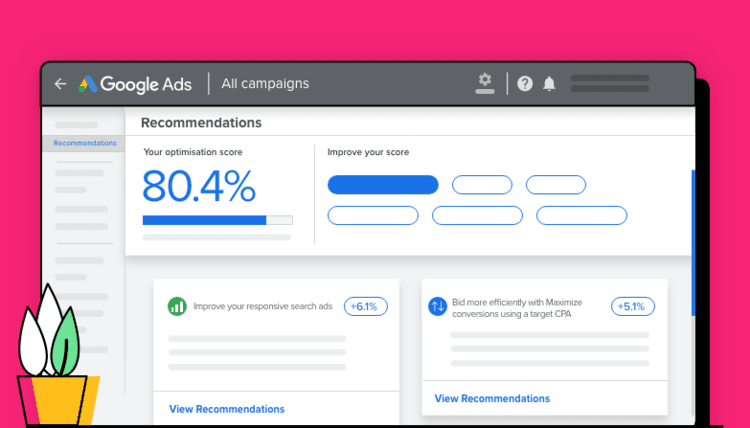If you’ve ever used Google Ads to run a paid campaign, you must have come across the Google Ads optimization score and wondered what it is and how it can help you.
Basically, the idea of this tool is to assist advertisers in optimizing their campaigns based on the score it provides.
But how does this score work? Is it truly beneficial, or is it just a ploy to push advertisers to spend more money? Let’s explore the Google Ads Optimization Score and see how you can leverage it to optimize your campaigns.
What is the Google Ads optimization score?
Google Ads optimization score is a useful tool by Google Ads that assigns a score to advertisers’ accounts. This score provides them with insights into how well their campaigns are doing and offers recommendations to improve their overall performance.
However, you may be wondering why it’s important to improve your Google Ads optimization score. The answer is simple: a higher score indicates that your account is healthier, more profitable, and more cost-effective. It ranges from 0% to 100%, where a score of 100% indicates that the campaigns are optimized for the best possible performance.
You can access the optimization score under the recommendations tab. It’s available at the Campaign, Account, and Manager Account levels.
With a quick look at the scoring bar, you get an instant idea of whether your campaign is doing well or there’s room for improvement.
The Google Ads Optimization Score analyzes your campaign settings and configuration and helps you identify where your campaigns are performing well and where they can be improved.
The score is available for active campaigns only. Fortunately, Google is constantly updating the list of campaigns for which this optimization score works. It’s currently shown for the following types of Google Ads campaigns:
- Search campaigns
- Display campaigns
- Discovery campaigns
- Video Action campaigns
- App campaigns
- Performance Max campaigns
- Shopping campaigns
Ultimately, the main benefit of using the Optimization Score is to ensure that your campaigns are performing as they should be and that you’re making the most out of your Google Ads investment. So, be sure to check it out and take advantage of this valuable tool!
How do Google Ads calculate your optimization score?
Google Ads campaign optimization score is a real-time calculation that takes into consideration a range of factors in your account and campaigns.
Its algorithm analyzes the statistics, settings, and status of your account and campaigns, as well as the impact of available recommendations and recent recommendations history.
Google’s recommendations depend on various external elements as well, like trends in the world of Google Ads, search volumes, etc. This means that your optimization score and recommendations can often change. Any modification made to your campaign or account, or shifts in the external trends affects your score right away.
With such a diverse set of factors impacting the calculation of the Google Ads optimization score, it’s helpful to break it down into several aspects to better understand the process:
- Real-time tracking – Every single change in your account and campaigns is tracked, and the score gets updated instantly.
- Other data factors – Google collects data from other advertisers’ campaigns in your niche, which is used to determine how their data and factors will affect your own campaigns.
- Your campaign goals – Based on your bid strategy, Google determines your business goals and generates recommendations to achieve them.
- Your account and campaign settings – Google monitors your active campaigns and overall account settings to determine how they impact the success of your Google Ads.
- Past and recent recommendations – The algorithm evaluates both historical and current recommendations and analyzes the effectiveness of previously implemented recommendations.
- Trends – Google follows search volumes and trends and incorporates their impact into the recommendations.

Understanding how Google Ads calculates your optimization score can help you optimize your campaign more effectively. By regularly monitoring it and making adjustments, you can improve your ad performance and gain a better Return on Investment (ROI).
What is a good optimization score for Google Ads?
Now that you know how Google Ads calculates your optimization score, you may be wondering what is a good optimization score. Well, there’s no such one-size-fits-it-all score and it mostly depends on your campaign and business goals.
It’s important to note that even a 100% Google Ads optimization score won’t guarantee miraculous results. Most experienced advertisers aim for an optimal average of 75%-80%, which is a good benchmark to strive for.
However, the ultimate goal is to stick to your campaign and business objectives and use this tool to help you achieve them.
So, before you start making some adjustments, remember, the optimization score should serve as a guide to improve your campaign’s performance and achieve your business goals. With a little tweaking and fine-tuning, you can increase it and see positive results.
Optimization score recommendations and their benefits
Aside from just a score, Google Ads also provides a bunch of recommendations. Whether it’s improving your ad copies, bidding, or keywords, these suggestions definitely help you make better-informed decisions.
But keep in mind that these recommendations are not mandatory, and you can choose to accept or dismiss them based on your campaign goals.
What I personally find quite a cool feature is the prediction of the potential impact of the changes. By having insights into the possible outcomes, you can determine more easily if these changes would bring the desired outcomes.
Undoubtedly, as an advertising platform, Google Ads aims to provide the best experience for its advertisers. Lower CPC, increased ROAS, better campaign performance, and overall positive results are the factors that make advertisers want to continue their campaigns on Google.
However, whether all of these recommendations align with your goals and whether you need to implement all of them, mostly depends on your specific objectives and personal experience.
If you’re a beginner at using Google Ads, you might want to test out a few of the different recommendations it comes with. With time, you’ll get a better understanding of what kind of changes are working well for you and what you can skip.
If you’re more experienced, you can more easily determine what can bring the results you’re aiming for, and what will just increase the optimization score number without leading to any significant benefits.
However, you shouldn’t listen to these recommendations blindly, nor should you ignore them. Use them as a reminder to revisit your ad campaign setup, keywords, or budget.
This tool can still give you some good ideas of what can make your Google Ads account better. Taking a look from time to time won’t hurt the healthiness of your campaign.
How to increase your Google Ads optimization score using the recommendations?
Once you grasp the concept of the Google Ads optimization score and its calculation, you can leverage it to enhance your Google Ads campaigns. To take advantage of this score, you can utilize Google’s recommendations.
It covers a wide range of areas and campaign types, currently counting above 80 different recommendations. To make it easier, Google has grouped them into seven types of recommendations:
- Ads and assets
- Automated campaigns
- Bidding and budgets
- Keywords and targeting
- Repairs
- Measurement
- Other
With such a diverse list of recommendations that you can get, attempting to implement them all at once can be a kind of a mess. Also, not all of these recommendations may always be suitable for you. Factors such as your business goals, target audience, and industry or niche can impact their effectiveness.

To fully leverage the Google Ads optimization score, it’s best to prioritize the critical areas that matter the most to your business.
Key optimization areas to focus on
Drawing from our own experience and extensive research, we have identified the following key areas that are worth being prioritized:
- Ad relevance: Ensure that your Google Ads are highly relevant to the keywords you are targeting and the landing pages they are linking to.
- Landing page experience: Make sure your landing pages provide a high-quality user experience, load quickly, are mobile-friendly, and are relevant to the ad and keywords.
- Ad format optimization: Choose the right ad formats for your campaign goals, and make sure they are optimized for different devices and placements.
- Keyword quality score: Continuously monitor and improve your keyword quality scores by focusing on relevance, click-through rates, and landing page experience.
- Ad copy and messaging: Craft compelling ad copy and messaging that speaks directly to your target audience and highlights the unique benefits of your product or service.
- Account structure and organization: Ensure that your Google Ads account is structured in a logical and organized manner, with ad groups that are tightly themed around specific keywords and topics.
- Bid optimization: Continuously monitor and adjust your bids to achieve the best possible ROI for your campaigns.
- Negative keywords: Regularly review and add negative keywords to your campaigns to exclude irrelevant traffic and improve ad relevance.
- Ad extensions: Use ad extensions to provide additional information and value to users, such as site links, callouts, and structured snippets.
- Conversion tracking and optimization: Track and analyze your conversion data to identify opportunities for optimization and improve your campaign performance over time.
Although this list isn’t exhaustive, it’s a great starting point to guide you in the right direction. Of course, there may be other areas that are more relevant to your specific business or campaign which you should also focus on.
Additional tips for increased ad campaign effectiveness
Before you start obsessing over your optimization score, remember that it’s not the only factor that matters. The overall effectiveness of your ad campaigns is just as important, so make sure you’re driving real results.
One thing that can seriously mess up your ad campaigns is fake clicks. It can be worthless to put all that effort into improving your Google Ads campaign optimization score if your campaign effectiveness is affected by click fraud, for example.
Tools like ClickCease can help you block fake traffic coming from click fraud, so you can focus on driving real results and improving your overall campaign performance. You can check it out with the free trial to keep your Google Ads clean from invalid traffic.
So go ahead, optimize away, but keep your eyes on the prize and focus on what really matters.

To sum it all up, I’ll wrap this article up with a brief overview of the benefits of improving your Google Ads optimization score, as well as common mistakes that you can avoid. Hopefully, these insights will be of help for your future optimization efforts.
Benefits of improving your Google Ads optimization score
Undoubtedly, Google Ads optimization score can be of great value for maintaining optimal campaigns and Google Ads accounts. Here are some of the benefits of having a high optimization score:
- Better Ad Placement: A higher optimization score means that your campaigns are performing well, which can lead to better ad placement. Google rewards advertisers with high optimization scores by placing their ads in the most prominent positions on the search results pages.
- Lower Costs: By improving your optimization score, you can lower your costs per click (CPC). Google Ads rewards high-quality campaigns by reducing the cost per click, which can result in significant savings.
- Higher Conversion Rates: A higher optimization score indicates that your campaigns are performing well. By improving your optimization score, you can reach your target audience more effectively, resulting in higher conversion rates.
- Competitive Advantage: By improving your optimization score, you gain a competitive advantage over other advertisers. A high score means that your campaigns are optimized for the best possible performance, which can help you attract more clicks and conversions than your competitors.
Common mistakes to avoid when improving your Google Ads optimization score
While it’s essential to improve your optimization score, it’s equally important to avoid common mistakes that can hinder your progress. Here are some common mistakes that you can avoid when trying to improve your optimization score:
- Focusing Too Much on the Score: One of the most common mistakes advertisers make is focusing too much on the optimization score. While the score is essential, it’s crucial to remember that it’s just a tool to help you achieve your campaign goals. It would be best if you stay focused on your campaign objectives and strategies, not just the score.
- Blindly Following Google’s Recommendations: Advertisers often make the mistake of blindly following Google’s recommendations without considering their impact on their business. Google’s recommendations can be helpful for sure, but they may not always be the best fit for your business. Evaluating each recommendation carefully and considering its impact on your campaigns before implementing it is crucial.
- Neglecting Your Overall Campaign Goals: Improving your optimization score should always be aligned with your overall campaign goals. Focusing solely on improving your score without considering your campaign objectives can lead to suboptimal results. Ensure your optimization efforts align with your overall campaign goals to achieve the best results.
- Not Monitoring Your Score Regularly: Your optimization score is not static; it changes based on various factors, including changes in your account or campaign settings. Therefore, it’s crucial to monitor your score regularly and make necessary adjustments to improve your score continually.
In conclusion, avoiding these common mistakes can help you optimize your campaigns more effectively and improve your overall Google Ads optimization score. Remember to focus on your campaign goals, evaluate Google’s recommendations carefully, and monitor your score regularly to achieve the best possible results.
